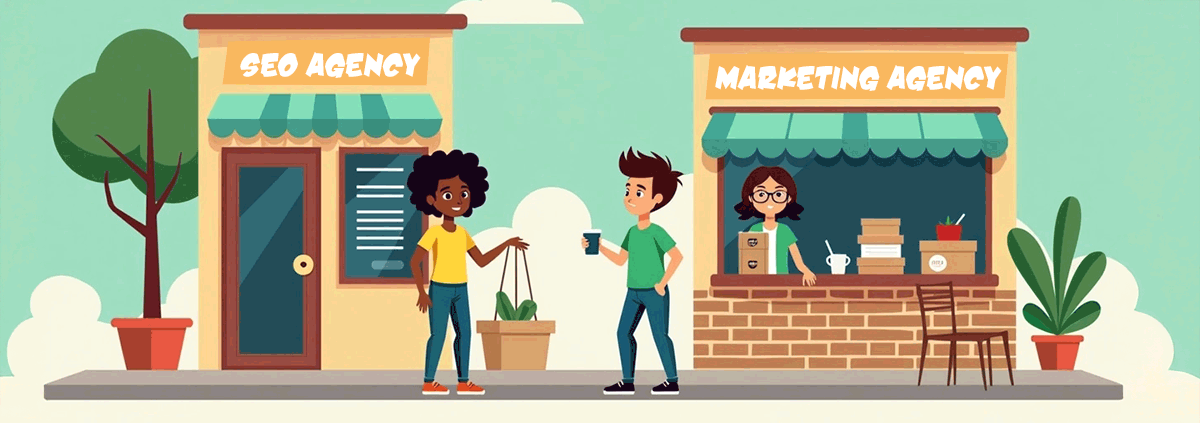When it comes to white labeling SEO services, I’ve seen two fundamental truths: one, the partnership should be beneficial for both sides, and two, it should be built on fairness. Treat your service providers with the same respect and integrity that you treat your own business.
If you’re the hiring agency, ask yourself this: Would you feel good signing the same agreement you’re asking your white label provider to sign? If the answer isn’t a confident “yes,” then something is off. A fair partnership starts with a balanced agreement — one that protects both sides, not just your own interests. If you wouldn’t sign it without hesitation, why should they? And if they sign it anyway, they won’t tell you they hate it — but chances are, they’re only agreeing because they need the business. The moment they don’t need you anymore, expect the worst. I’ve seen it happen. A partnership built on imbalance and resentment is just a ticking time bomb.
Over the years, I’ve been on both ends of the equation. I’ve provided white label SEO services to agencies, and I’ve also hired agencies to do the same for me. In my 25+ years in the SEO industry, I’ve witnessed successful, long-term collaborations — but also plenty of partnerships that crashed and burned due to unrealistic demands, unfair expectations, and a lack of mutual respect.
My goal with this article here is to help you avoid those mistakes and set up a white label relationship that actually works.
If you see your white label provider as nothing more than an invisible, replaceable workforce — expected to jump at your every command — the partnership is doomed to fail. Worse, this mindset can even lead to legal disputes down the road.
The agencies that succeed in maintaining long-term white label relationships are the ones that recognize their providers as business partners, not just contractors, and offer them a level of security and respect. In my experience, the partnerships that thrive are the ones that have lasted for decades, while others that fail to create a fair working environment have barely lasted.
A partnership starts with the contract. Promises, expectations, and friendly agreements mean nothing if they aren’t backed by clear, well-defined written agreement. That’s why I’ve put together this comprehensive guide, outlining everything a white label SEO agreement should include. More than just a legal document, it’s a blueprint for a partnership that is built to last.
What is White Label Contracting?
White label contracting is when one company provides services or products that another company rebrands as its own. In digital marketing, this often applies to SEO, website development, and advertising. The actual service provider stays behind the scenes, while the hiring agency presents the work as its own.
From the client’s perspective, all SEO services come straight from the hiring agency — even though a third party, the white label agency, is doing the work. That means the hiring agency handles client communication, sets pricing, and ensures everything delivered matches what was promised.
Then there’s the white label provider — the one doing the heavy lifting. They handle the actual SEO work, whether it’s optimizing websites or putting together reports. But they do it quietly, behind the scenes. The client never even knows they exist. In most cases, they’ll communicate using the hiring agency’s email.
Defining Roles and Responsibilities
When setting up a white label agreement between the hiring agency and white label agency, one of the most important things to nail down is who does what. Without clear roles, things can get messy fast.
In a white label setup, the hiring agency is the face of the operation. They’re the ones bringing in clients and setting client expectations. A key question to address early on is whether the hiring agency wants the white label provider involved in the sales process. When the white label agency plays a role in sales, expectations can be set more accurately. Otherwise, if the hiring agency sells on its own, there’s a risk of overpromising services that the SEO provider might not fully agree on.
I’ve seen this firsthand. One of the most ridiculous promises I ever heard from a hiring agency was telling a client they would rank #1 on Google for specific keywords. When the project landed on our table, the client’s expectations were completely off — thanks to a claim that sounded like something out of a third-world SEO sales pitch: “We’ll get you to #1.” That’s not how SEO works.
Check out my article about the issue of promising rankings:
Article Recommendation:
What followed was months of frustration. The client became obsessed with certain keyword rankings, constantly questioning why certain keywords weren’t in the top spot — while completely ignoring the bigger picture. Meanwhile, we had skyrocketed their traffic and leads by over 300% in just six months. But none of that mattered. The hiring agency, lacking real SEO knowledge, had made the wrong promises. In the end, the client walked away — not because the work wasn’t delivering results, but because their expectations had been set up for failure from the start.
This is why getting the sales process right from day one is crucial. If the hiring agency isn’t well-versed in SEO, involving the provider in sales discussions ensures that clients receive realistic commitments, not empty guarantees.
That’s why it’s essential to clearly define each party’s role during both the sales and also after-sales process.
Another crucial detail to spell out in the contract is that the white label provider is an independent contractor, not an employee. This distinction matters because it means they control how they deliver their services, as long as they meet the agreed standards. They’re responsible for their own costs, team management, and work structure — so there should be no micromanaging from the hiring agency.
Mutual Obligations: Keeping the Partnership Fair and Balanced
A white label partnership isn’t just about outsourcing work — it’s about creating a fair system that benefits both sides. The hiring agency gets to offer high-quality SEO services without handling the technical work, while the white label provider secures a steady stream of business. But for this arrangement to work long-term, both parties need clear commitments to each other. That’s where mutual obligations come in.
One key commitment is ensuring that clients receive consistent service for the full duration of their contracts. If a client signs a six-month or year-long SEO deal with the hiring agency, the white label provider should remain involved for the entire period.
Without clear agreements, either party could suddenly back out — creating potential for major issues. If the white label provider were to drop the partnership, the hiring agency’s clients could be left without the services they paid for. On the flip side, if the hiring agency decides to have clause in their contract allowing them to white label providers mid-contract, it creates instability for the white label provider, making it harder for them to plan for the future and allocate their workforces.
When there’s no security, the white label agency may be less motivated to deliver quality work, knowing they could be replaced at any moment. Worse, if a legal dispute arises, the white label provider could argue that the hiring agency created an unfair advantage and misuse of power by having the freedom to remove clients at will.
A strong partnership should never come down to legal battles, but the reality is that uncertainty can create a toxic, unstable contract. The best way to prevent this is to keep things fair and transparent. The white label provider should be given the same contractual term that the hiring agency has with its client — without modifications.
The same logic applies to contract renewals. If a client extends their agreement, the white label provider should remain involved under the same terms. However, if either party wants to renegotiate due to changes in workload, pricing, or other circumstances, those discussions should happen upfront before renewal.
Mutual obligations also extend to financial risks. Typically, if a client cancels their contract or stops paying, the financial burden falls on the hiring agency. Since the agency isn’t getting paid, they shouldn’t be expected to continue paying the white label provider. That said, for the provider to take on that risk, they need long-term contractual security with the hiring agency’s client.
To keep things balanced, both parties should commit to flagging any payment issues as early as possible. Whether it’s a missed invoice, a communication breakdown, or project delays, transparency is key.
A successful partnership isn’t just about sharing contracts — it’s also about sharing responsibilities. By agreeing to these mutual obligations upfront, both the hiring agency and the white label provider can plan ahead, avoid conflicts, and build a stable, long-term working relationship that benefits everyone.
Client Transfers: How to Handle Transitions Smoothly
In a white label SEO partnership, clients are at the center of everything. Since the hiring agency is the face of the business, any transfer of client work to the white label provider needs to be handled carefully. A clear process ensures a smooth transition without confusion or service disruptions.
Client transfers don’t happen automatically. Before handing off any client, both parties need to agree on the arrangement. This doesn’t mean piles of paperwork — often, a simple email confirming the transfer is enough. The key is that both sides are aligned on responsibilities before any work begins.
That said, transfers should never be mandatory. The hiring agency isn’t obligated to send every client to the white label provider, just as the provider isn’t required to take on every project. If a client isn’t a good fit — whether due to budget constraints, service scope, or workload capacity — either side should have the flexibility to decline. This ensures that both businesses operate independently while still collaborating on the right opportunities.
However, if the hiring agency expects the provider to take on every client, then an exclusivity agreement should be in place. But consider that also an exclusivity like this goes both ways — if the white label provider commits to handling all clients, the hiring agency must agree to send every SEO client their way. There is no half way in into a partnership. Do it right or leave it. Fairness is key in any partnership.
That said, most white label providers aren’t locked into working with just one agency. They often serve multiple partners, just as hiring agencies may work with different providers for various projects. This flexibility allows both businesses to scale without being tied to a single arrangement.
Once a client transfer is confirmed and the white label provider takes over, their responsibilities kick in immediately. From that point on, the white label provider is accountable for delivering services according to the hiring agency’s terms. Clear expectations and strong communication during this process help prevent misalignment and ensure that clients receive seamless service — no matter who’s doing the work behind the scenes.
Ending the Partnership: How Termination Works
No business partnership lasts forever, and that’s okay. A solid white label agreement should outline a clear and fair termination process so both parties know what to expect if they decide to part ways. Having this in writing prevents confusion, last-minute scrambles and potential disputes.
Either party can choose to end the partnership, but that doesn’t mean everything stops overnight. A proper exit plan ensures a smooth transition, giving both businesses time to tie up loose ends and make necessary adjustments.
Termination should not mean an immediate shutdown of services. Any clients already assigned to the white label provider before the termination should still be taken care of. The white label provider should remain responsible for completing the agreed-upon work, while the hiring agency is still accountable for its contractual commitments.
Instead of burning bridges, this venue allows the hiring agency and white label provider to move forward smoothly — whether that means working together again in the future or simply parting ways on good terms.
Legal Safeguards: Protecting Both Sides with Solid Terms
A white label SEO partnership isn’t just about delivering services — it’s also about ensuring both businesses are legally protected. Without the right Terms & Conditions (T&C) in place, things can go south quickly if a client disputes services, refuses to pay, or even threatens legal action. That’s why having clear legal safeguards in the agreement is essential.
Both the hiring agency and the white label provider should have their own T&C to protect themselves and each other. Since the hiring agency interacts directly with clients, it’s their responsibility to ensure that legal protections also extend to the white label provider. If a client complains about SEO results, disputes a contract, or refuses to pay, the hiring agency’s terms should already include provisions that mitigate these risks.
To make things easier, many white label providers offer their own T&C templates specifically tailored to SEO, which the hiring agency should be able use or adapt. This ensures key aspects — such as service scope, liability limits, and intellectual property rights — are properly covered. In fact, a professional SEO provider typically has more robust T&C than a hiring agency that isn’t deeply specialized in SEO. It’s recommended that the hiring agency incorporate key legal protections from the provider’s terms into their own agreements when engaging with clients. It is therefore highly recommended that the white label agency is willing to share their T&C with the hiring agency.
Intellectual Property: Who Owns What and Why It Matters
One of the most critical aspects of legal protection in a white label SEO partnership is Intellectual Property (IP) rights. The white label provider puts in the work, so it’s essential to ensure that their strategies, reports, and SEO deliverables aren’t misused or resold without permission — whether by the hiring agency or the end client. A well-structured agreement should clarify that while the hiring agency can use the deliverables for their clients, they don’t own the underlying processes or proprietary tools used to create them.
The hiring agency may be the face of the service, but the actual work — reports, strategies, website designs and revamps, landing page creations, and campaign structures — should remain the property of the white label provider. Without a clear agreement, misunderstandings can arise over who owns what and how those assets can be used.
In a typical white label setup, the provider retains full ownership of their proprietary assets, even if they are presented under the hiring agency’s branding. This includes SEO methodologies, reporting templates, processes, software tools, and strategies. While the hiring agency is free to offer similar services independently, they should not be able to take the white label provider’s work and resell it as a standalone product. The provider’s intellectual property is their competitive advantage, and the agreement ensures that it isn’t misused, copied, or repurposed without consent.
That said, the hiring agency’s clients do have the right to use the deliverables they receive. The provider grants them a non-exclusive, non-transferable license, meaning they can utilize reports, optimizations, and other materials for their business needs — but they should not be able to resell or redistribute the work beyond what was originally agreed upon.
Establishing clear IP boundaries protects both businesses. The white label provider ensures their proprietary work isn’t exploited, while the hiring agency can confidently offer services without worrying about ownership disputes later.
Sharing Contractual Documents: Transparency Without Oversharing
In any white label partnership, trust and transparency are key. A fair agreement allows the white label provider to review client contracts from the hiring agency to understand the service terms, timelines, and expectations they’re expected to meet. However, to protect the hiring agency’s business interests, sensitive details — such as pricing and unrelated scopes of work — can be redacted. This ensures the provider has the necessary context while preserving the hiring agency’s competitive edge.
This level of transparency helps prevent miscommunication and misaligned expectations. When both parties have a clear understanding of what’s been promised to the client, the white label provider can deliver services more effectively, and the hiring agency can confidently manage the client relationship without unnecessary back-and-forth. Additionally, the white label provider may offer valuable insights on refining scopes, deliverables, and expectations to create a more realistic and effective service agreement with the hiring agency’s client.
Non-Solicitation and Exclusivity: Keeping the Partnership Fair
When a hiring agency and a white label provider work together, both invest time and effort into building strong client relationships. To maintain fairness, a well-structured white label agreement should include non-solicitation and exclusivity clauses to prevent either party from undercutting the other if the partnership ends.
For the duration of the agreement, the white label provider should continue servicing the assigned clients as long as they remain with the hiring agency. However, if a client decides to leave the hiring agency, the provider should not directly offer the same services to them for a set period of two years (which is industry standard) — unless done through the hiring agency.
Similarly, the hiring agency should respect certain limitations. If the agreement ends but the white label provider is still working with certain clients, the hiring agency should not take over those services or bring in a third party to replace the white label provider. This restriction remains in place only while the client is actively working with the white label provider, ensuring that both parties recognize and respect each other’s contributions.
That said, these restrictions only apply to clients originally managed under the agreement. The hiring agency should remain free to work with new clients however they see fit, and the white label provider can take on other business as well. These clauses simply prevent either party from unfairly capitalizing on the partnership by cutting the other out after the groundwork has been laid.
Confidentiality: Protecting Trust and Business Integrity
Throughout the collaboration, both the hiring agency and the white label provider gain access to valuable business information — client details, pricing structures, SEO strategies, and proprietary processes. A strong confidentiality clause ensures this information remains protected, not just during the partnership but long after it ends.
Confidential information isn’t limited to client lists or financial data. It also includes trade secrets, internal workflows, reporting methods, and any other knowledge that gives either party a competitive advantage. Sharing or misusing this information beyond the agreed scope could harm one party’s business, which is why both sides must commit to strict confidentiality.
What makes this clause particularly important is that confidentiality should not expire when the agreement does. Even if the partnership ends, neither party can disclose or use the other’s proprietary information for their own gain. This protects both businesses from potential competitive risks and should ensure that any sensitive data remains secure, no matter what the future holds.
Building a Strong, Lasting White Label Partnership
A successful white label SEO partnership isn’t just about delivering great services — it’s about creating a fair, transparent, and structured collaboration where both parties can thrive. When roles are clearly defined, legal safeguards are in place, and mutual obligations are respected, both the hiring agency and the white label provider can focus on what they do best without worrying about unnecessary risks.
By setting expectations early, protecting intellectual property, and maintaining trust through confidentiality, white label partnerships become more than just a business arrangement — they become a foundation for long-term growth and success. When both sides operate with professionalism, fairness, and a shared commitment to quality, it’s a win-win for everyone involved — including the clients.
At the end of the day, the best white label relationships aren’t just about outsourcing work. They’re about building a partnership that delivers real results, fosters trust, and allows both businesses to scale with confidence.

 by
by 


